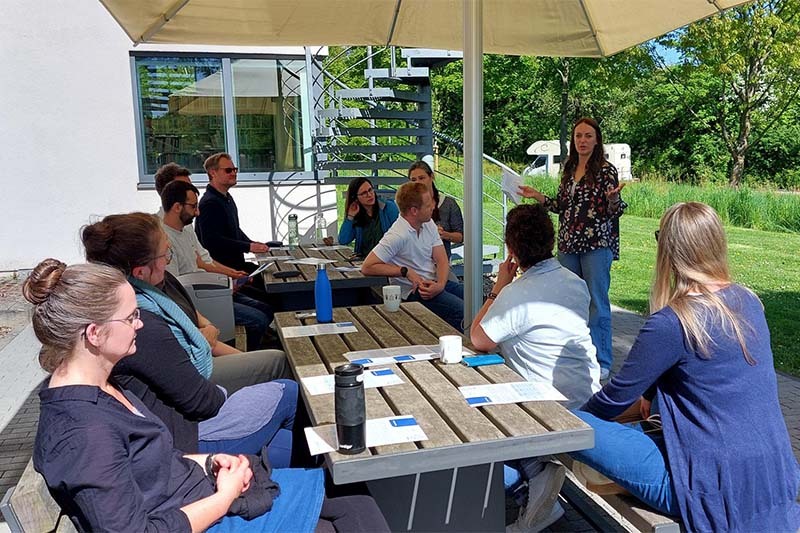News
CATALPA Graduate School: Workshops, Exchange, Symposium
[18.08.2025]This year saw the launch of the CATALPA College. It offers doctoral students a structured and interdisciplinary program as well as exchange with and between postdocs.
 Photo: CATALPA
Photo: CATALPA
"The CATALPA Graduate School aims to create optimal conditions for a successful academic career through interdisciplinary collaboration, joint exchange and practical research into complex issues in digitised higher education," explains Dr Natalia Reich-Stiebert, who coordinates the college's activities within the CATALPA office. Doctoral students network across disciplinary boundaries to develop a common language and a mutual understanding of different ways of thinking and scientific approaches. "This is an important foundation for their scientific future," says Reich-Stiebert.
Communicating your research in a Science Slam
An important element of the programme is continuing education workshops. The outcome of the latest workshops was five popular science lectures accompanied by a vibrant supporting programme at the Lutz Theatre in Hagen. During a two-day workshop, a group of intrepid researchers rose to the challenge of not only filling knowledge gaps with their research content, but also putting together an entertaining programme. These entertaining short lectures are called science slams. "We worked out the topics together and learned the basics. We will continue to refine our contributions and coach each other until the big day," explains Natalia Reich-Stiebert, who initiated the Science Slam. The contributions cover a range of topics, from design fiction to mental load and self-regulation with AI, and from choices to social behaviour.
Brown Bag Meetings with Self-set Topics
Mutual support is also provided during the monthly Brown Bag Meetings. The colleagues meet on campus to eat the lunches they have brought with them. Topics have included individual questions as well as general issues such as dealing with rejections from editors. Postdocs in the group have reported on their submission strategies, explaining how self-imposed deadlines in the form of conference contributions help with organisation.
Networking at the Poster Symposium
In autumn, the poster symposium will focus on interdisciplinary networking. CATALPA doctoral students and postdocs will present their work, challenges and skills in poster format to encourage conversation and identify common ground. This has previously led to joint interdisciplinary publications.
Together with Prof. Dr. Marcus Specht (CATALPA Research Professor of Learning Sciences) and Dr. Niels Seidel (Senior Researcher at CATALPA), she has been involved in the design of the project from the outset. The three researchers have extensive experience in learning analytics research, ensuring that the implementation of the new teaching architecture meets evidence-based criteria. The team is working hand in hand with the Center for Learning and Innovation.
Scalable findings for transfer
According to Prof. Dr. Marcus Specht, this makes the project a prime example of how CATALPA operates. "LEAD:FUH demonstrates how learning engineering functions in our living lab," he explains. "We are building on learning analytics pilot projects from our research and implementing the new teaching architecture with interim evaluations throughout FernUni. Thus, we are delivering scalable insights for the higher education landscape."
The project will start on October 1, 2025. Stiftung Innovation in der Hochschullehre is initially providing €4.77 million in funding. Following a positive interim evaluation, a further €2 million will be made available. The aim of CATALPA is to use LEAD:FUH to contribute scientifically sound, scalable findings that can be transferred to other degree programs and university locations.

